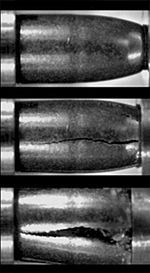Frangibility
Frangibility is a property that describes the ability of a material or object to break, shatter, or fragment under impact, pressure, or stress. This characteristic is crucial in various fields, including materials science, engineering, safety engineering, and military science, as it affects the design, application, and safety of structures, devices, and systems.
Overview
Frangibility is often considered when designing objects that need to break apart safely upon impact to minimize the risk of injury or damage. Examples include breakaway posts used in road signage, frangible bullets designed to disintegrate upon hitting a hard surface to reduce collateral damage, and certain types of glass that are designed to shatter into less harmful pieces. The concept is also applied in the design of structures that need to collapse in a controlled manner under certain conditions, such as in earthquake engineering.
Materials and Design
The frangibility of a material is determined by its physical and chemical properties, including its brittleness, ductility, tensile strength, and elasticity. Materials such as glass, certain ceramics, and some metals can exhibit high levels of frangibility under specific conditions. Engineers and designers must carefully select materials based on their frangibility to ensure the safety and effectiveness of their products and structures.
Applications
Safety Engineering
In safety engineering, frangibility is a critical consideration in the design of crash barriers, lighting poles, and other roadside infrastructure. These items are designed to break or yield upon impact from a vehicle, thereby absorbing some of the crash energy and reducing the risk to the occupants.
Military Science
The military uses frangible materials in the design of certain munitions, such as frangible bullets, which are intended to break apart upon impact to minimize over-penetration and reduce the risk of collateral damage in training environments or urban warfare.
Aerospace and Aviation
Frangibility is also an important factor in aerospace and aviation, particularly in the design of structures around airports. Objects such as approach lights and navigational aids must be frangible to minimize the damage to aircraft in the event of a collision.
Challenges and Considerations
Designing for frangibility involves balancing the need for an object to perform its intended function while ensuring it breaks safely under specific conditions. This requires a thorough understanding of the material properties and the forces that the object may encounter during its lifecycle. Additionally, there are challenges in predicting how complex structures or systems will behave when part of them fails, making it essential to conduct extensive testing and simulation.
Conclusion
Frangibility is a key property that influences the design and application of a wide range of materials and systems. By understanding and harnessing this property, engineers and designers can create safer, more efficient products and infrastructure that better protect human life and property.
Transform your life with W8MD's budget GLP-1 injections from $125.
W8MD offers a medical weight loss program to lose weight in Philadelphia. Our physician-supervised medical weight loss provides:
- Most insurances accepted or discounted self-pay rates. We will obtain insurance prior authorizations if needed.
- Generic GLP1 weight loss injections from $125 for the starting dose.
- Also offer prescription weight loss medications including Phentermine, Qsymia, Diethylpropion, Contrave etc.
NYC weight loss doctor appointments
Start your NYC weight loss journey today at our NYC medical weight loss and Philadelphia medical weight loss clinics.
- Call 718-946-5500 to lose weight in NYC or for medical weight loss in Philadelphia 215-676-2334.
- Tags:NYC medical weight loss, Philadelphia lose weight Zepbound NYC, Budget GLP1 weight loss injections, Wegovy Philadelphia, Wegovy NYC, Philadelphia medical weight loss, Brookly weight loss and Wegovy NYC
|
WikiMD's Wellness Encyclopedia |
| Let Food Be Thy Medicine Medicine Thy Food - Hippocrates |
Medical Disclaimer: WikiMD is not a substitute for professional medical advice. The information on WikiMD is provided as an information resource only, may be incorrect, outdated or misleading, and is not to be used or relied on for any diagnostic or treatment purposes. Please consult your health care provider before making any healthcare decisions or for guidance about a specific medical condition. WikiMD expressly disclaims responsibility, and shall have no liability, for any damages, loss, injury, or liability whatsoever suffered as a result of your reliance on the information contained in this site. By visiting this site you agree to the foregoing terms and conditions, which may from time to time be changed or supplemented by WikiMD. If you do not agree to the foregoing terms and conditions, you should not enter or use this site. See full disclaimer.
Credits:Most images are courtesy of Wikimedia commons, and templates, categories Wikipedia, licensed under CC BY SA or similar.
Contributors: Prab R. Tumpati, MD


